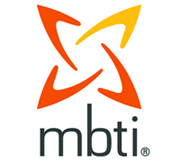Using MBTI® Type to Foster Individual Development
Using MBTI® Type to Foster Individual Development
Remember: While every type has its unique combination of assets, each is also subject to a downside due to potential overuse or rigidity. Continue to leverage your strengths and the strengths of others but seek opportunities to address developmental needs and grow professionally.
- To Extraverts: “Practice Introversion by counting to 10 when you’re feeling especially action-driven or enthusiastic, or reflecting on ideas and plans to fully consider them before acting.”
- To Introverts: “Practice Extraversion by soliciting input from others and seeking assistance with formulating plans, even if you prefer to approach the task independently.”
- To Sensing types: “Practice Intuition by creating a one- to two-page executive summary describing the trends or patterns suggested by the data under consideration.”
- To Intuitive types: “Practice Sensing by using precise, accurate details in a report or project that you don’t believe merits such information.”
- To Thinking types: “Practice Feeling by moving outside your normal range of conversational topics to share some personal facts, details, or insights about yourself.”
- To Feeling types: “Practice Thinking by purposely giving simple, direct, and concise feedback to others.”
- To Judging types: “Practice Perceiving by scheduling one day a month at work to “go with the flow” and noting any value that such flexibility brings.”
- To Perceiving types: “Practice Judging by determining what daily tasks you could do consistently and then developing a routine and sticking to it.”
-
- What behaviors would you like to start, and how might you begin making small steps toward making the requisite changes?
- How might you track your progress to determine what new behaviors or approaches are making a positive impact? Now, consider your own type preferences and how they relate to the way you approach your daily tasks and progress toward your professional goals.
Source: Adapted from Hirsh and Kise, Introduction to Type® and Coaching (1998), pp. 13–14, www.cpp.com
More From Michele
Introverted Intuition (NI)
Introverted Intuition (NI) INTJ - INFJ The function is when you get insights that seem to come from nowhere. Information, facts, and data are stored and then internally processed. This later emerges from the unconscious. For example:Those “aha’ moments....
Extraverted Intuition (NE)
Extraverted Intuition (NE) ENTP - ENFP "What IT MEANS" The function when we are focusing our attention on the multiple possibilities. Making connections & patterns between items in our external world. These possibilities are sparked by our external world....
Introverted Sensing (SI)
Introverted Sensing (SI) ISTJ - ISFJ "What WAS" The function when we are focusing our attention on remembering, using our 5 senses. Not in real-time. Amazingly skilled at recalling details. For example:Listening to a dog bark. When our brain focuses on...




